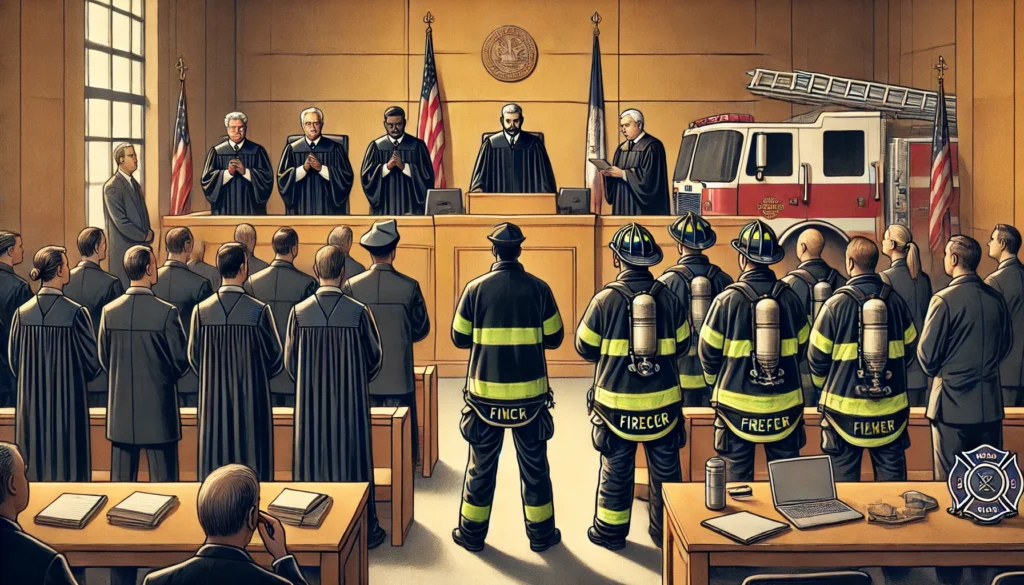Analysis: Bacon v. Woodward, No. 22-35611 (9th Cir. 2024) (Decided 6/18/2024)
Issue: The primary issue in Bacon v. Woodward concerns whether the City of Spokane’s implementation of Washington Governor Jay Inslee’s COVID-19 Proclamation, which required state agency workers to be fully vaccinated, violated the Free Exercise Clause of the First Amendment as applied to Spokane firefighters who sought religious exemptions.
Rule: The Free Exercise Clause of the First Amendment prohibits the government from enacting laws that restrict religious practices unless the law is both neutral and generally applicable. If the law is not neutral or generally applicable, it must pass strict scrutiny, meaning it must be narrowly tailored to serve a compelling governmental interest.
Application (Majority Opinion):
- Neutrality and General Applicability: The majority, led by Judge R. Nelson, determined that the City of Spokane’s implementation of the vaccine mandate was not generally applicable. While the Proclamation required vaccination, Spokane exempted firefighters from neighboring departments that granted religious accommodations. This exemption for a secular group (neighboring firefighters) while denying the same for religious objectors showed a lack of general applicability. This inconsistency undermined the Proclamation’s stated goal of stopping the spread of COVID-19, thus triggering strict scrutiny.
- Strict Scrutiny Analysis: The majority held that the City’s application of the Proclamation was not narrowly tailored. It found that less restrictive means, such as testing, masking, temperature checks, and social distancing, could have been employed to achieve the same public health goals without infringing on religious rights. Moreover, the policy was underinclusive, as unvaccinated firefighters from neighboring jurisdictions, who were exempt, continued to work in Spokane, which undermined the City’s interest in mandatory vaccination for its firefighters.
- Retrospective and Prospective Relief: The majority also addressed the mootness issue, concluding that the firefighters’ claims for punitive damages and prospective injunctive relief were not moot despite the rescission of the Proclamation. The firefighters sought damages for past harm and reinstatement to their jobs, which the court could still grant, maintaining a live controversy.
Application (Dissenting Opinion):
- Neutrality and General Applicability: Judge Hawkins dissented, arguing that the City’s uniform application of the Proclamation to its employees, treating both medical and religious objectors the same, demonstrated neutrality and general applicability. The existence of mutual aid agreements with neighboring departments did not, in his view, make the policy discriminatory against religious objectors within Spokane.
- Rational Basis Review: The dissent argued for applying rational basis review, under which the Proclamation would be upheld as long as it was rationally related to a legitimate governmental interest. Given the compelling interest in stemming the spread of COVID-19, Judge Hawkins believed the City’s implementation of the vaccine mandate met this standard.
- Denial of Leave to Amend: The dissent also supported the district court’s decision to deny the firefighters’ request to amend their complaint, noting that the plaintiffs failed to justify their delayed request and lacked diligence, thus the court did not abuse its discretion in denying leave to amend.
Conclusion: The majority reversed the district court’s dismissal of the firefighters’ Free Exercise claim, finding that the City’s application of the Proclamation was not generally applicable and failed strict scrutiny. The case was remanded for further proceedings, allowing the firefighters to pursue their claims for punitive damages and potential reinstatement. The dissent would have affirmed the district court’s decision, applying rational basis review and denying the request for amendment due to lack of diligence.
This decision underscores the stringent requirements for laws impacting religious practices and clarifies the boundaries of religious exemptions in public health mandates during emergencies
